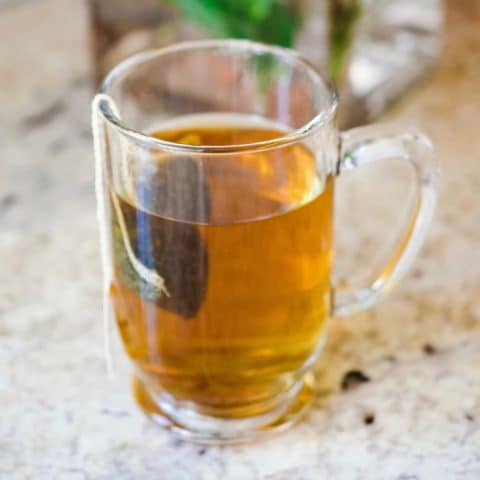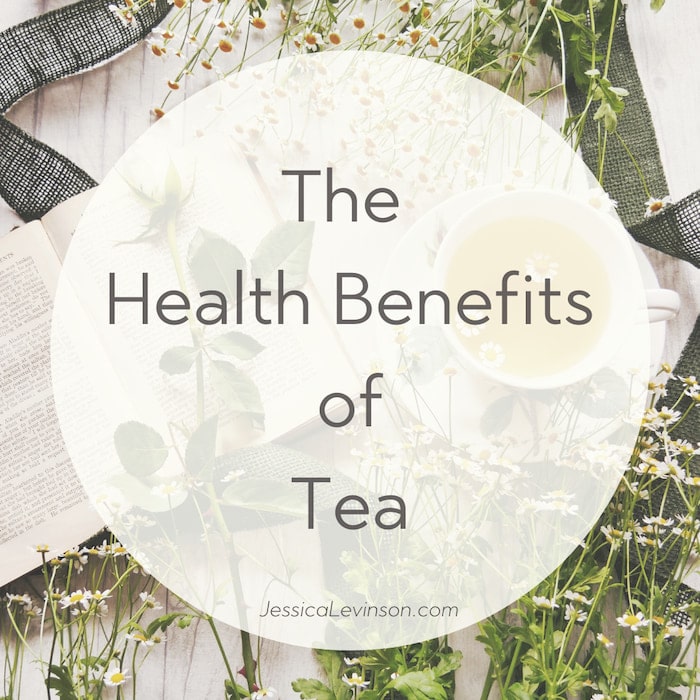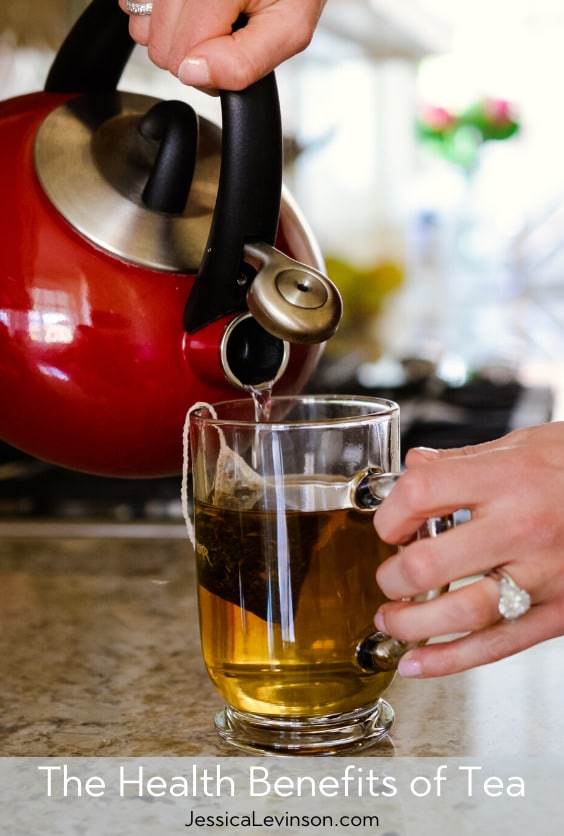The Health Benefits of Tea
What better way to stay warm this winter than with a cup of hot tea. Find out the health benefits of tea and the best way to make your own cup.
This page contains affiliate links. See below for full disclosure statement.
Whatever your goals are for the New Year, they no doubt revolve around some element of self care. Trying to make it to the gym more? Self care. Want to eat healthier? Self care. Aiming to get to yoga on time? Self care. Some of these resolutions – most in fact – require a lot of work and preemptive thought. But there’s at least one way to take care of yourself that won’t take too much effort, and since the weather is cold for most of us, it’s also the perfect time of year to add it to your resolution list:
Have a cup of hot tea!
Health Benefits of Tea
January happens to be Hot Tea Month, so there’s no better time to make drinking tea a new habit. Tea is a great alternative to water – and in fact tea is the second most widely consumed beverage in the world, only surpassed by water! Recent research shows that tea also has some newly proven health benefits. In one study, tea was given to participants who later reported improved mental benefits, such as clarity of mind and relaxation.
What’s responsible for these benefits? The key components of tea: L-theanine and caffeine.
- L-theanine is an amino acid (part of a protein) that promotes mental relaxation and attention, and it’s found almost exclusively in tea leaves!
- Caffeine is found in small amounts in tea and improves alertness, mood, and attention. But don’t fret if you’re worried about the caffeinated tea keeping you up at night – the amount of caffeine in tea is so small that it will not disrupt sleep patterns like high doses of caffeine in coffee do.
Other benefits of drinking tea include improved cardiovascular health, weight management, and hydration.
Decaffeinated Teas
Decaffeinated teas, also known as herbal teas, are caffeine-free. Many herbal teas are infused with herbs and spices, which contain many vitamins and minerals to energize your body and mind. These teas are a great choice for unwinding and relaxing from a long day.
- Chamomile Tea: Chamomile has relaxing and calming properties and works as a natural sedative, which helps people have a better night’s rest and can help alleviate stress, depression, and anxiety.
- Cinnamon Tea: The mildly spicy flavor of cinnamon is absolutely delicious and the body of research on its health benefits is growing. Some research shows that cinnamon may help reduce LDL cholesterol levels and increase HDL cholesterol levels, while other research shows a beneficial effect of cinnamon on blood sugar levels.
- Peppermint Tea: Peppermint tea is commonly consumed for its stomach soothing effects and ability to relax the gastrointestinal tissue. That said, it is not recommended for people with reflux, hiatal hernia, and kidney stones.
Caffeinated Teas
True tea is made from the leaves of an Asian evergreen known as Camellia sinensis. White tea, green tea, oolong tea, and black tea all come from this plant, and all contain caffeine.
- Green Tea: Green Tea contains a high level of catechins, antioxidants that fight cell damage and may aid in cell damage prevention. The most abundant catechin in green tea is Epigallocatechin gallate (EGCG), which you may have heard of before. Drinking a few cups of green tea throughout the day may reduce certain risks of heart disease. In a Chinese study in Archives of Internal Medicine, a 46-65% hypertension risk reduction was found in regular consumers of green or oolong tea compared to non-consumers of tea. Other potential green tea benefits: improved cholesterol levels, reduced risk of Alzheimer’s disease, and slowed growth of some cancers.
- Black Tea: Black tea is the most common variety of tea around the world. It is also the strongest and has the highest caffeine content. Some studies have shown that black tea may reduce the risk of stroke and alleviate stress levels. A 2010 research study showed that black tea might speed the recovery from daily stresses in life. Those who drank black tea were found to have lower levels of the stress hormone cortisol in their blood after a stressful event compared with a control group.
- Oolong Tea: Oolong tea is similar to black tea but fermented for less time, making it slightly less bitter. Some research points to oolong as an aid in weight loss, possibly a result of the combination of antioxidants and caffeine leading to an increase in metabolism.
How To Make A Cup Of Hot Tea

How to Make a Cup of Tea
Now that you know the health benefits of tea, learn how easy it is to make a cup!
Materials
- 1 teaspoon loose tea leaves (caffeinated or decaffeinated) or 1 tea bag
- 1 cup boiled water
Tools
Instructions
- Steep tea in boiled water for 3-5 minutes.
Notes
To avoid all the “good stuff” from evaporating during the steeping process it is best to place a lid or saucer on top of your cup or teapot.
Any of the above teas can be found in your local grocery stores. If using loose tea leaves, prepare it with a tea steeper like this one. You can also fill your own tea bags with loose tea, which is a fun way to create your own blend.
Are you a tea drinker?
What’s your favorite type of tea?
Disclosure: This page contains Amazon Affiliate links. If you purchase products through these link, your cost will be the same but I will receive a small commission to help with operating costs of this blog. As always, all thoughts and opinions are my own and I only recommend products I truly believe in. Thanks for your support!





I am not a big tea drinker, but I would love to switch over to tea sometimes! I drink wayy to much coffee. I do love “lemon zinger” tea with some honey!
haha..I know the feeling!
I am not a daily tea drinker, but whenever I do have it I wonder why I don’t drink it more often. 😉
I’m the same way Melanie!
No way it’s tea month!? Awesome! I usually drink 3 cups a day! I can’t get enough tea!
There seems to be a month for everything! Now more reason to celebrate your daily tea!
I am a tea drinker! A heavy tea drinker indeed! 🙂 My favorite tea is matcha green tea. It is so light and refreshing and a great way to start or wrap-up a day’s work. 🙂
Thanks for sharing Erin! Will have to try that one!